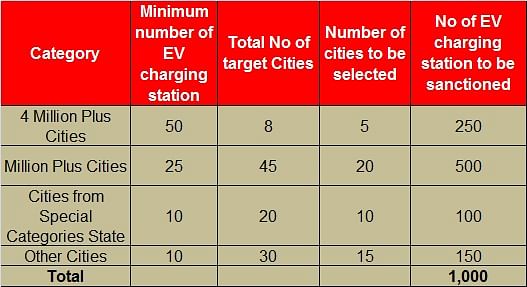Government invites bids for 1,000 EV charging stations under FAME II
The government plans to make available 6,000 charging points through 1,000 EV charging stations in the country.
The Indian government is looking to accelerate adoption of electric vehicles in the country. From the FAME scheme's second phase with a big-ticket budget of Rs 10,000 crore, or the recent proposed mandate for electrifying all two- and three-wheelers starting 2023, the government is aggressively going about its ambitious electrification drive.
As part of the government's electrification drive and to create the necessary infrastructure, the Ministry of Power had issued guidelines and standards for charging stations in December 2018, which incidentally none of the EVs sold in the country, except for the just launched Hyundai Kona Electric SUV can utilise.
To address that, the necessary EV charging infrastructure is being developed. The Department of Heavy Industry (DHI) Ministry has invited proposals from urban local bodies, municipal corporations, PSU (state/central) and public/private entities who are interested in developing EV charging infrastructure in different states and cities.
The proposal's eligibility covers cities that have million-plus population according to the 2011 census; Smart cities notified by MoHUA; satellite towns connected to 7 metros (Delhi, Mumbai, Kolkata, Chennai, Hyderabad, Bangalore and Ahmedabad); major cities of special categories State/Union Territories and the capital city of all states.
Targeting 1,000 charging stations and 6,000 chargers

Under the proposal, the government will incentivise setting up of around 1,000 charging stations with a minimum of 6,000 chargers. According to DHI, the maximum incentive that can be availed under the FAME India Scheme Phase II will be determined by three categories (A, B and C) ranging from 50 percent to 100 percent. The categories are classified as follows -
Category A - (70% of the cost): Charging stations established at public places for commercial purpose to charge EVs and available to any individual without any restrictions for charging their vehicles; and are installed as per MoP notification and its amendment thereof. (e.g., EV charging station established at municipal parking lots, petrol stations, streets, malls, and market complexes among others.)
Category B - (100% of the cost): Charging stations established within the premises of a state or central government office complex, government hospitals/clinics/dispensaries, government educational institutions or any other public office for non-commercial use. (e.g., EV charging station established in Udyog Bhawan, Shram Shakti Bhawan, PSU office Complex)
Category C - (50% of the cost): Charging stations established within the semi-restricted premises for commercial or non-commercial purpose for charging of EVs. However, said chargers are also available to any individual for charging of EV without any restrictions. (e.g., EV Charging stations established for cab aggregators for charging of taxies, co-operative housing societies).
In addition, each entity is also required to submit a detailed business plan for running, operation and maintenance of the proposed charging stations. The party will also need to give an undertaking that it will fund the remaining cost of the charging station including cost of upstream electricity infrastructure like transformers from its own fund. And, finally, the details of the grid-connected solar power plant, if any.
RELATED ARTICLES
Rajiv Bajaj reappointed MD and CEO of Bajaj Auto for five-year term
Bajaj Auto’s Board of Directors has approved the re-appointment of Rajiv Bajaj as the company’s MD and CEO for another f...
JSW MG Motor launches Comet EV Blackstorm edition
The key highlights of the Comet EV Blackstorm, which is now the top-end variant, are its ‘Starry Black’ exterior along w...
Maruti Suzuki begins production at new Kharkhoda plant
Phase 1 of the Kharkhoda plant will have an annual production capacity of 250,000 units and produce the Brezza compact S...






 16 Jul 2019
16 Jul 2019
 22221 Views
22221 Views





 Autocar India
Autocar India



 Ajit Dalvi
Ajit Dalvi

